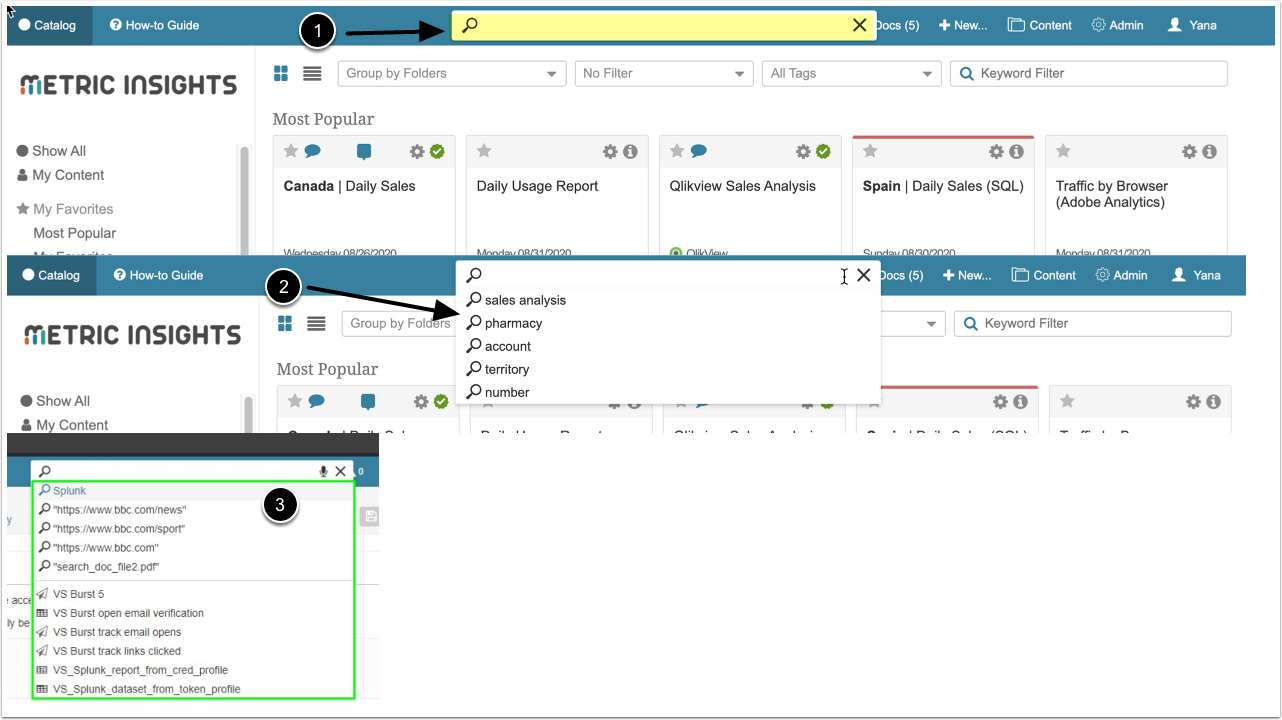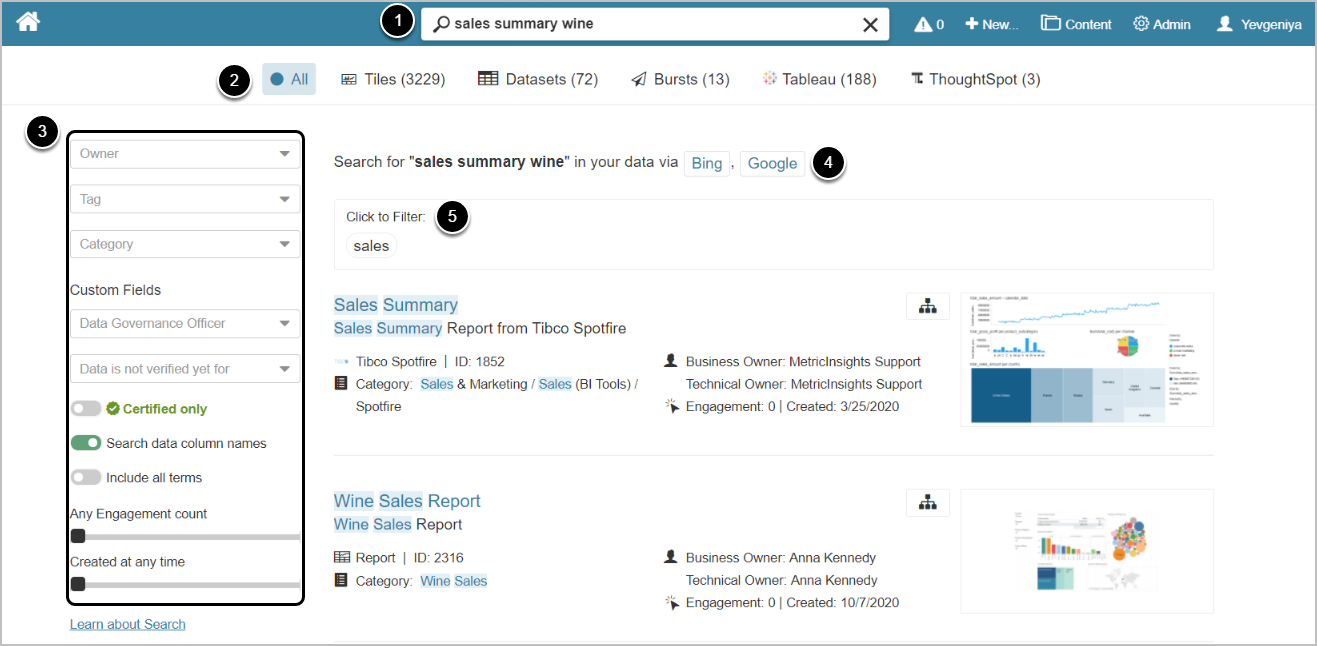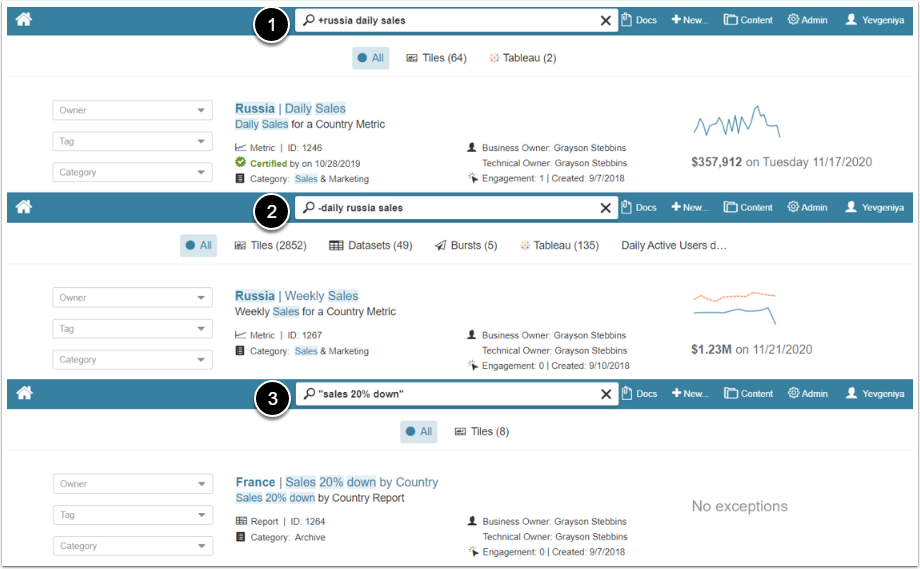The Intelligent Global Search feature is very flexible and produces more results than our previous searches. Each page in Metric Insights has a Search text box in the middle of the header, so a search can be initiated from any where in the system. The search can be as simple as entering just a word, part of a word/phrase, or complex using a wide variety of Search Entities (described below). When searching, "Recent requests and opened items" are displayed in the Search suggestion drop-down.
Your organization's Admin configures the Search feature and determines what is to be searched and how results are presented. Intelligent Search works with different types of Search Entities. The search includes metadata of the Search Entities; i.e., information is searched across Names, Descriptions, Categories, Tags, and Custom Fields, but not the data it contains. The system relies on metadata when locating Objects (except for Datasets) that meet the search criteria. For Datasets, additional information about columns included is defined during the Search Setup process. It is e.g., Tableau (1).
In Release 6.2.5:
- Query Language parameters have been restructured to provide even more powerful and flexible search capabilities.
- Portal Pages have become searchable. The search for Portal Pages supports such queries as names, keywords, descriptions, Tags, page text, and iframe URLs. Query Language filters are also implemented.
- Global Search capabilities have been expanded to support searching by Custom Fields and their values using the Query Language logic.
For example: Custom Field = color, its values = red, blue, green. Users can search by “color: blue”.
In Release 6.3.0:
- Users can abort the update of search indexes by clicking Cancel.
- New label “Index last updated” has been added to the Search results, Search Setup, and Search Tuning pages.
- User Map is a search entity, allowing users to search by it and adjust its search scores.
- User Maps can be hidden from search in Editor.
In Release 6.4.2:
- Global Search supports partial search. For example, a search for "sal" will provide results for "sales". A search term must include at least three letters to return results. Partial search does not work with Query Language Enhancers.
1. How to Initiate Search
- The search block is available at the top of each page.
- When the user clicks into the Search box, recent Search arguments are shown
- After many searches have been executed, "Recent requests and opened items" are displayed in the Search suggestion drop-down to allow the user to select one of these search arguments if desired.
1.1. Sample Search Results
- In the image above, a search for the words "sales summary wine" produced results as shown.
- Filters at the top of the page can include: All, Tiles, Datasets, Bursts, and BI tools. When clicked, the results of each type found during the search is displayed.
- The filter sidebar allow you to run a more precise search with additional criteria such as:
- Owner
- Tag
- Category
- Custom Fields (more information in Adding Custom Fields)
- Certified
- Column Names
- All terms
- Engagement count
- Time created
- Search across External Tools (configured by Admins)
- Quick search by available Tags
The following sections provide more information on available options and constructing a Search query.
NOTE: The Include all terms toggle switch is disabled by default. However, there is a System Variable that makes this toggle enabled by default. To reach it, access Admin > System > System Variables, find the GLOBAL_SEARCH_ALL_TERMS_ON Variable, and set it to "Y". Be aware that only System Administrators have access to the System Variables page.
2. Available Search Entities
Below are the Objects that can be searched in the system. They can be found directly by Name, Description, or other field or by a relation – a Tag or by related Dataset. The full list of fields and relations can be found under Admin > System > Search Setup > Advanced Search Tuning.
- Datasets
- User Maps
- Documents
- Elements
- External Reports
- Notification Schedules
- Portal Pages
To be able to search by these entities, users should have access as outlined in the section below.
3. Security
For Admins and System Admins, no restrictions apply to the results returned.
For Power and Regular Users, the search engine analyzes user Privileges and Permissions, including the the View or Edit Access level that has been granted to a User and/or inherited from the User's Group(s), and limits results to those Search Entities to which the user has at least View Access:
- Elements with or without Category
- Categories
- Dimension Value of Elements
- Dimensions through User Maps
- Multi-Metrics
- Datasets
- Bursts
- Data Sources
- Documents
- User Maps
4. Query Language Construction and Filters
The system supports applying filters to the search. A filter in this context refers to one of predefined words followed by a colon. The system interprets the words after the colon as filter values.
List of available filters:
- Tag
- Category
- Dataset
- Data Source
- Owner
- Certified by
- Certified
- Type
For [tag] filter, words placed after the colon to the end of the line (or beginning of a filter name) become filter values:
- "Daily sales category: devops developers tag: test" finds Search Entities by words "daily sales" within Сategories containing words "devops" or “developers” and a tag containing the word "test"
For [category] filter, "daily sales category: marketing" will look for Search Entities by words "daily sales" within Categories containing a word "marketing".
[Owner] filter is applied to Technical and Business Owners and Data Stewards.
[Certified] filter is a boolean filter. It produces only Certified elements (or vice versa) and recognizes such values as:
- "Yes", "true", "Y", "1" for True
- "No", "not", "false", "N", "0" for False
The system allows searching by a user name (display_name value) in filters:
- Daily sales certifiedby: John
For [type] filter with predefined values:
- Element (elements)
- Reference (references)
- Burst (bursts)
- Dataset (datasets)
- Dataset data (datasetdata, dataset-data, dataset_data)
- Content_type
- Metric (metrics)
- Multi-metric chart (multi-metric)
- Report (internal report)
- External report
- Other external content (other content, external content)
- Document
- Portal_page
Values from several words can be written with a white space, underscore, or hyphen.
[Type] filter is recognized by predefined values. So, if a value is not recognized, it is used as a set of general words. Their value is parsed to the end of the known value and not to the end of the line:
- "Daily sales type: metric" > "daily sales" elements with a type “metric”
- "Daily sales type: external report canada"> "daily sales Canada" with a type "external report"
- "Daily sales type: unknown" > "daily sales type unknown" (no type filter has been recognized)
Filter name that is not included in the predefined list is recognized as [Custom Field]. The mechanics are as follows:
- The word preceding the colon is recognized as Custom Field name:
- "show me cars color: red" > custom_field=(color="red")
- All words following the colon are recognized as Custom Field values:
- "show me cars color: red green blue" > custom_field=(color="red" OR color="green" OR color="blue")
- All words following the colon but preceding the next filter name are recognized as Custom Field values:
- "show me cars color: red type: metric blue" > custom_field=(color="red") AND type="metric"
- If Custom Field name or value contains several words, use quotes:
- "show me "cars color": "navy blue" > custom_field=("cars color"="navy blue")
5. Query Language Enhancers
The Search Engine recognizes additional symbols: [plus], [minus], and [double quotes].
- [Plus] limits the results to include the specified word or phrase
- [Minus] exclude specified items
- [Double quotes] applies a special form of a word or order of word for the search
The enhancers can be also applied to query language filtering:
- Daily sales category: "finance marketing"
- Daily sales category: -finance


